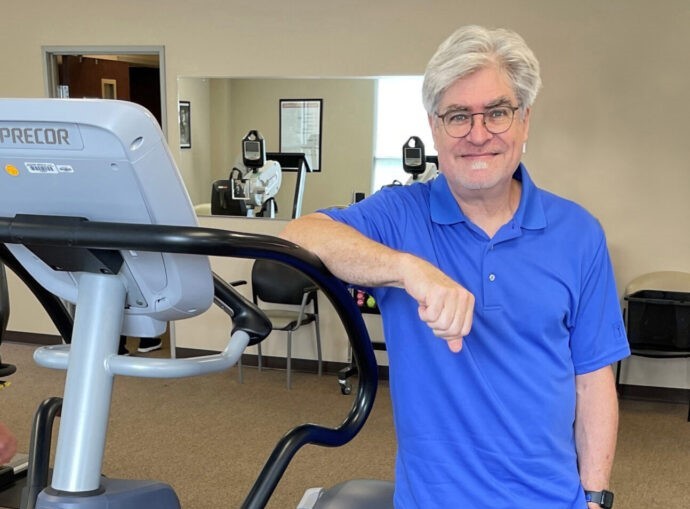Cardiac rehabilitation is a great benefit to patients who have experienced a heart event like cardiac arrest or angina. The results are obvious from the many current and former patients who speak highly of the staff at Parkwest Cardiopulmonary Rehabilitation.
Some patients do more than rehabilitate during the prescribed weeks of exercise. John Hook is one of them. Hook underwent bypass surgery in October 2022, and when asked if he wanted to start cardiac rehab, he immediately said yes. What he didn’t know is that he was about to change his life far beyond his prescribed course of exercise. You might say Hook “got hooked” on a better way of life because of Parkwest Cardiopulmonary Rehabilitation.
“I don’t think I’ve gone three days in a row without exercising since I walked out of here,” he says during a return visit to talk about his progress. “It changed my life. That’s not an overstatement. It really did.”
Hook’s rehab started with a full assessment, and then a personalized exercise plan was developed to help him regain strength and stamina. Like all the other patients at Parkwest Cardiopulmonary Rehabilitation, he was also given opportunities to learn about lifestyle changes to support the exercise that was bolstering his heart’s ability to function properly.
He learned about healthy choices including nutrition improvements, resulting in a better way to live. As soon as his prescribed exercises were finished, Hook decided to continue the good work that began in rehab, and he hasn’t slowed down or missed a step since. At the start of rehab, every patient is encouraged to think about how to move forward when rehab is over. Cardiac rehab isn’t just about fixing what’s wrong, it’s about creating a better quality of life and making it less likely that a patient will need heart procedures or experience cardiac emergencies in the future.
Hook was assisted in developing goals like running a 5K and getting back on his bike. Today he has energy to spare. Sometimes he even feels antsy, full of energy, ready to get up, get out and get moving.
There are many components to the program that helped Hook achieve the level of health and fitness that he has today. He credits exercise physiologist Rhonnda Cloinger for pushing him just the right amount. Whenever he achieved a certain level of ability, she always encouraged him to go further, but in a way that she knew would be safe and efficient.
“They’re wearing a heart monitor the entire time, so we’re getting a constant EKG and heart rate readout,” Cloinger says. “Every time patients come to exercise, they’re strapping on that monitor, and there is a health care professional watching that monitor as each patient is on the exercise floor.”
A dietitian helped Hook make some changes, most of all cautioning him to monitor sodium intake. This former heart patient has a handle on his diet now, just like he has a handle on his bike as he rides through East Tennessee.
“If I hadn’t come here, if I had just had the surgery and that was it, I wouldn’t be feeling like I am now,” Hook says. “I’m glad that didn’t happen. I really am.”
His advice to other heart patients is first to take advantage of cardiac rehab, and second, to not only see it through to the end, but to also take the lessons learned into life after cardiac rehab is over. Hook’s life is better because he’s putting his heart into it. “If you listen to what they’re telling you and if you do it and you keep doing it after you’re done, I guarantee you’ll be happy,” Hook says. “You’ll feel better about yourself. I can’t see how you would. These guys are great.”
The Beat Goes On

Rhonnda Cloinger, exercise physiologist
Rhonnda Cloinger is a certified exercise physiologist and cardiac rehab professional at Parkwest Cardiopulmonary Rehabilitation. She loves helping people transition from being heart patients to walking out and breathing easier. But what she loves even more is knowing some of her patients will never come back.
Their hearts beat with new strength as they take what they’ve learned and apply it to their lives permanently. The greatest benefits from cardiac rehab come when patients don’t just exercise as prescribed, but also make cardiac rehab part of a life- style change. Some effort has to be put into making time for exercise, and there might be a few sacrifices where a patient’s diet is concerned, but Cloinger’s patients who have gone on to live healthier lives long-term say it’s worth it.
“When you finish rehab, it’s just the beginning,” Cloinger says. “We’re giving you the tools, and we’re hopefully giving you the motivation to develop the physical ability to be able to do more than what you were doing before you came.”
Something that sets Parkwest Cardiopulmonary Rehabilitation apart from many other cardiac rehab programs is a strong focus on an education component. The medical staff isn’t just present to fix what’s wrong. The medical staff is set to launch patients into the best years of their lives. “The nutrition side of it, the emotional side of it, signs and symptoms of heart issues or other concerns,” Cloinger says. “We have a variety of topics, and we’re one of the few rehab programs that offer as much education as we do.” Focused teaching on diet and other measures are tools patients can take with them long after the last session ends. Patients are encouraged from the get-go to think about how they can live a healthier life long-term.
Parkwest Cardiopulmonary Rehabilitation is a place for people who have gone through what is called a “heart event” like bypass surgery, heart attack or having stents placed in the heart. A physician referral is needed.
Info: https://www.covenanthealth.com/parkwest/services/cardiopulmonary-rehabilitation/TreatedWell.com/cardiacrehab or call 865-531-5560.
Covenant Health provided information for this article.

